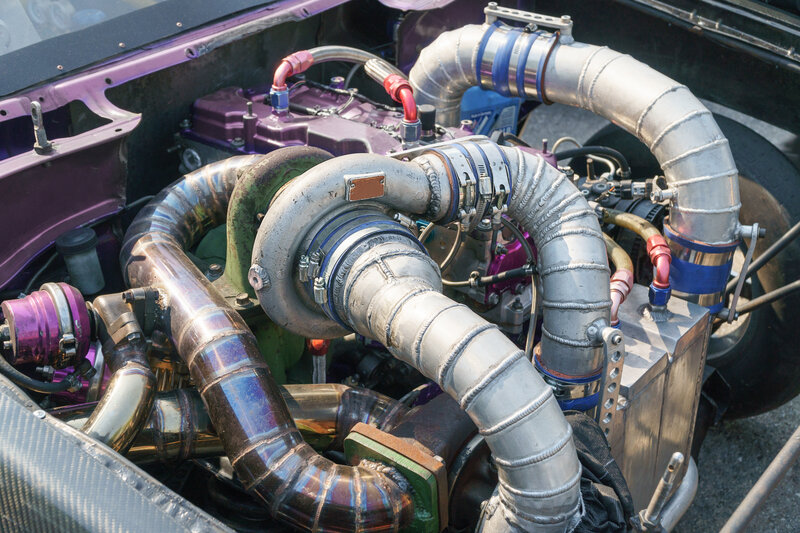
Turbochargers, which people commonly call "turbos," are optional vehicle parts that can extend an engine's lifespan and efficiency. However, while these components can keep you from needing engine repairs, they won't last forever.
Here, All Bay Diesel, California's leading vehicle experts, explain what causes a turbo to fail, how to remedy the most common issues, and why their team is qualified to tackle whatever problems your turbo has.
Impact damage is destructive enough to break any vehicle part; unfortunately, it's one of the leading causes of turbo failure. Impact damage can happen upon collision, but all it takes to destroy a turbo is small, foreign matter like bolts and rocks reaching the vehicle's interior.
These materials' most common access points are worn-down air hoses, clogged air filters, and failing gaskets. Fortunately, you can protect your turbo from impact damage through regular maintenance and preventative measures. These include:
Follow these steps, and your turbo won't come in contact with any foreign materials.
Carbon buildup happens naturally in vehicle turbos, dragging down their performance and the engine's strength. That strain will eventually crack and destroy your turbo and can cause issues in the Exhaust Gas Recirculation (EGR) valve.
If the EGR valve suffers enough carbon buildup, it can jam, lose the boost charge, and lead to rising exhaust gas temperatures. Unfortunately, there's no easy way to remedy carbon buildup. Fortunately, the experienced technicians at All Bay Diesel can help.
All Bay Diesel is the top-rated mobile mechanic in the Bay Area. We know what causes a turbo to fail and will quickly diagnose and repair any issues plaguing your device.
If you've ruled out both of the above and are still asking yourself, "what causes a turbo to fail?" you're likely dealing with an oil issue.
Oil leaks are the most common turbo lubrication issue. They typically happen because of cracks in the air intake hose, EGR system, or turbo. However, another possibility is oil contamination, when foreign particles reach the oil filter through a malfunctioning bypass valve or overworked engine.
You can protect your turbo from an oil leak or contamination incident by:
Some oil leaks and contamination caused by cracked exhaust systems or broken inlet pipes might require professional fixes. All Bay Diesel is here to answer the call if you need us. We've addressed countless cases with these symptoms, so we know how to fix your turbo efficiently and quickly.
If you don't address your oil leaks or contaminations, your turbo will experience oil starvation, which happens when the component doesn't receive enough lubricant. Oil starvation causes severe issues you can avoid by regularly checking your vehicle's oil or bringing your car into All Bay Diesel for professional maintenance.
Human error is often what causes a turbo to fail most severely. Turbos need time to cool off and unspool after a drive, especially at high speeds. So, when you drive too quickly or excessively rev your engine, you'll wear the turbo down and eventually break it.
Fast driving isn't the only type of human error that causes turbo failure. For example, chipping your engine outside the standard specifications, adjusting your vehicle's wastegate, or incorrectly installing a turbo can strain the device to its breaking point.
Avoid excessively using your engine and not giving it time to cool off after a high-speed drive to avoid wear and tear. Periodically checking your engine and wastegate to ensure they're running will also help you prevent wear and tear issues.
Your engine and turbo need functioning oil feed and boost pipes to live. If one of those components disconnects or breaks, it can destroy your turbo and put your engine on its last legs.
Broken intercoolers present similar issues, straining turbos and reducing their lifespan and power. You can fix these issues by reconnecting loose pipes, replacing broken ones, and checking your engine every few months for signs of wear and tear. If you're unsure how to take care of these problems yourself, reach out to All Bay Diesel.
Though catalytic converter issues aren't what causes a turbo to fail the most, they're worth considering if you've ruled out every other possible issue.
Catalytic converters help vehicles run smoothly by converting pollutants into non-toxic substances. When they clog, they'll suffocate your engine and cause your turbocharger to fail. Experts refer to that suffocation as "buffering" because it slows down the intake impeller, cutting off the oxygen flow to the engine and causing fatal overheating.
The only way to prevent catalytic converter issues is to replace the part before it wears down, generally after 93,000 miles. Though catalytic converter replacement is a nightmare for inexperienced technicians, it's no match for All Bay Diesel.
Now that you know what causes a turbo to fail and how to fix it, we'll look at simple ways you can care for your turbo and avoid damage.
Despite their complexity, turbochargers are simple to look after. All you need to do to extend its lifespan is lubricate it, ensure it's receiving sufficient airflow through the intake and exhaust systems, and call for professional maintenance once you notice a drop in efficiency.
All Bay Diesel tackles all types of vehicle repairs, no matter the size or severity of the project. Our expert team diagnoses issues quickly and works tirelessly to fix them in a flash and get you back on the open road.
Contact All Bay Diesel today at (925) 522-1780 to learn more about what causes a turbo to fail or what to do if your diesel engine has been sitting for a long time.